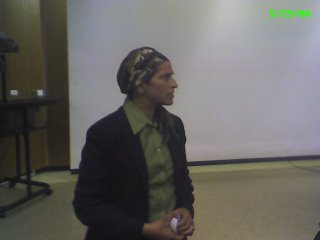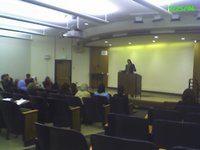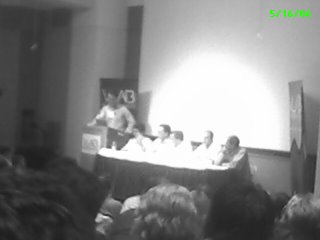To pique my interest further, when the event was posted on our local mailing list for Muslims in Silicon Valley, someone raised the question of whether she was another of "those" people. Especially since the first picture to be found on the Internet was one in which she appears with Aminah Wudud, who led the most public and publicized instance of a woman leading people in prayer. Someone on the list then pointed out her very solid background as a youngster who grew up in the Bay Area Muslim community.
You can read my live notes of the event at the following three posts:
http://ifaqeer.blogspot.com/2006/05/muslim-women-event-at-stanford.html
http://ifaqeer.blogspot.com/2006/05/muslim-women-event-at-stanford-part-2.html
http://ifaqeer.blogspot.com/2006/05/muslim-women-event-at-stanford-qa.html
To wrap up, and talking to her and others after the event, I have to say that I actually came away with some of the depression I often exhibit about American Muslims a little diminished. Though I have to also say, maybe out of habit, that she's from an older "generation", so to speak, of people, and younger people, whether here in American Muslim communities or in Muslim countries are increasingly radicalized.
And on a related note, having met her and Richa Nagar in the same weekend was quite an experience. Both people with South Asian roots; both scholars; both women; and, in their ways, feminists. They definitely break the mould of the impression folks would have of feminists. In Asifa Q's case I don't think she'd identify herself that way; though she doesn't shy away from the term) and she also defies the stereotypes of the headscarf-wearing Muslimah engaged in these discussions.
And to draw another arc, the last event by ISSU's that I attended was a lecture by Dr. Azza Karam, an Egyptian scholar who works with the UN. [I hadn't sorted out access to Stanford's wireless network yet and wasn't able to post from that event--and then have been lazy posting those notes. I will soon. I promise!] Listening to these two women, and meeting Maha El-Gennaidi of IMG at a previous ISSU event (when they hosted Ahmed Naseef last year to talk about the phenomenon of "Progressive Muslims" in North America) has been quite an education, too. I know this is almost a vacuous question, but when the talk shows--even on NPR--want to talk to an Muslim women, why don't they call on these folks? I know Irshad Manji and Asra Nomani and maybe even Asma Gull Hasan on the one hand and Ingrid Mattson on the other make for good radio and TV, but try these women for a change and ask them the tough questions: we all--Muslims included--might learn a few things in the process.
Technorati tags applicable to this post: Muslim Women - Asifa Qureshi - Feminism and Islam - Muslim Feminists - Islam



